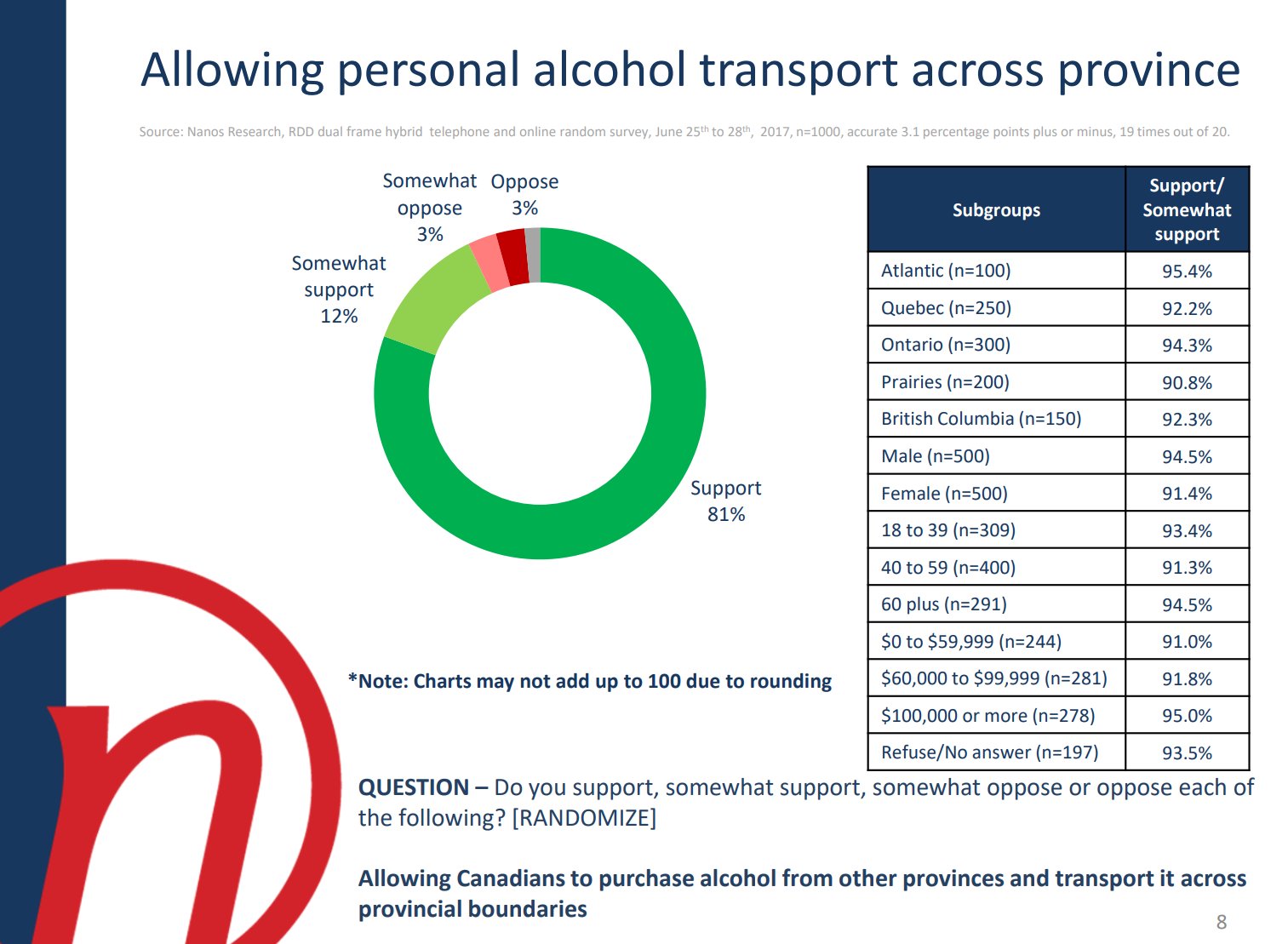
The Canadian Vintners Association (CVA) and its members today expressed disappointment with the Supreme Court of Canada’s ruling on Her Majesty the Queen v. Gerard Comeau. The case challenged restrictions on interprovincial trade, an issue the CVA has been working on for over a decade.
A version of the ruling is explained in this National Post story here.
“We respect the Court’s ruling but are disappointed at this missed opportunity to remove interprovincial trade restrictions,” said Dan Paszkowski, President & CEO of the CVA. “Removing restrictions would have opened the door to allowing consumers to order wine for direct delivery to their home from any Canadian winery located in any province. We call that Direct-to-Consumer, it is something nine out of 10 Canadians believe should be permitted, and we now eagerly await the provinces making this choice available to their citizens.”
In October 2012, Gerard Comeau (very top photo) of New Brunswick purchased beer and spirits in Quebec and drove back to New Brunswick. He was charged with possessing liquor purchased from outside the province in quantities that exceeded the province’s prescribed limit, an offence under section 134 of the New Brunswick Liquor Control Act. The trial judge held that section 134(b) of the Liquor Control Act constitutes a trade barrier (violating section 121 of the Constitution Act, 1867) and dismissed the charge against Mr. Comeau. The case subsequently made its way to the Supreme Court, which concluded today that the trial judge erred in overturning binding precedent and that although Section 121 prohibits laws that in their essence and purpose impede the passage of goods across provincial borders, it does not prohibit laws that yield only incidental effects on interprovincial trade.

“We will continue our work with the federal / provincial / territorial governments’ Alcoholic Beverages Working Group to allow interprovincial wine delivery from wineries to consumers,” continued Paszkowski. “It’s important to recognize that interprovincial trade barriers affect a range of industries, including wine.”
Unfair interprovincial trade barriers have impeded Canada’s wine industry growth and prevented consumers from purchasing the Canadian wines of their choice.
“We are disappointed that the Court didn’t express stronger views on the need to remove interprovincial trade barriers,” said Paul A. Bosc, President & CEO, Château des Charmes. “Most wine sold in Canada is imported largely because it is so difficult for Canadians to obtain wines from any province other than the one they live in. No other wine producing country has these kinds of restrictions.”

Canada’s wine industry had seen the ruling as a way to open the doors to direct-to-consumer wine purchases across the country, something consumers believe should be done.
Direct-to-Consumer would lead to important growth for the country’s highest value agricultural industry. Indeed, free interprovincial trade would positively impact the economy across the country. Industry research shows that for every $1.00 spent on Canadian wine in Canada, $3.42 in Gross Domestic Product (GDP) is generated across the country.
This is the official statement from Christine Coletta, of Okanagan Crush Pad, who was in the group of BC winery intervenors
Statement from Christine Coletta,
Okanagan Crush Pad

The Supreme Court of Canada decision on the Comeau case may not be as bad as it seems.
There is disappointment across the country; the Supreme Court of Canada has affirmed the constitutionality of a New Brunswick law that ensnared a man (Gerard Comeau) who brought home beer and liquor from neighbouring Quebec.
The unanimous high court decision affirms the constitutional legitimacy of provincial liquor monopolies and makes it clear that provinces have the power to enact laws that restrict commerce if there is another overriding purpose — like maintaining public safety and protecting public health.
The ruling allows interprovincial barriers to stay in place, as long as the primary goal of the restriction is not to place restrictions on interprovincial trade, protect a local industry, or punish another province.
The ruling does not provide immediate access to a national market for the five small BC wineries that joined the case as third-party intervenors, 50th Parallel Estate, Liquidity Wines, Okanagan Crush Pad, Noble Ridge Vineyard & Winery, and Painted Rock Estate Winery.
However, Shea Coulson, the lawyer who represented the BC intervenors, is optimistic about the ruling. Coulson states that when one looks deeper into the ruling, one will read that it’s now unconstitutional to enact a law or a policy that, as its primary purpose, imposes a tariff or “tariff-like” measure on another province’s products and that future courts will have to look at the effects of a law on the ground to determine if it is, in truth, performing a protectionist function rather than serving a legitimate provincial purpose. He also says that the spirit of the Court’s judgment is supportive of national free-trade that balances local interests with national interests and is critical of protectionism and trade wars between the provinces.
Christine McConnell Coletta, owner of Okanagan Crush Pad Winery, was one of the small BC winery intervenors hoping to have the national market thrown wide open.
She understands that there are nuances to the ruling.
“It was not realistic to expect that this case would be the bringing down of the provincial monopolies,” she said. “The monopolies play a key role in provinces, providing revenue to health and other social programming.”
“While the country is expressing its disappointment that Comeau lost his case, the decision does make a small step in the right direction, although many hurdles at the provincial level now lay in our path. The small BC wineries will work with the Canadian Vintners Association and the British Columbia Wine Institute to advocate for interprovincial Direct-to-Consumer sales until the laws change.
And I will continue to ship my wine across Canada to anyone who orders it.
Consumers want convenience and a great choice of Canadian wines.
With the recent boycott of BC wines by the Alberta government and the looming wine challenge from other countries over the grocery channel, BC wineries need all the support and help they can get.
We add greatly to the agriculture base and the tourism narrative across the province in addition to being a key player in shaping BC’s culinary scene. Our business health is important to the provincial economy. We will continue to work tirelessly to achieve that.”
Ontario wine industry disappointed
with Supreme Court ruling
The Winery & Grower Alliance of Ontario (WGAO), the Wine Council of Ontario (WCO), the Grape Growers of Ontario (GGO) and their members today expressed disappointment with the Supreme Court of Canada’s ruling on Her Majesty the Queen v. Gerard Comeau. The case challenged restrictions on interprovincial trade.
“We are disappointed that this opportunity to remove interprovincial trade restrictions has been missed,” said Del Rollo, Chair of the WGAO. “This is an important issue for small, medium and the relatively large wineries in Ontario. We will continue to fight for consumers’ ability to order Canadian wine wherever the winery is and wherever they live in Canada. We hope whoever is elected on June 7th makes it clear that they support Ontarian’s and Canadian’s ability to order wine directly to their homes from any Canadian winery located in any province.”
“We will continue our work with the federal/provincial/territorial governments’ Alcoholic Beverages Working Group to allow interprovincial wine delivery from wineries to consumers,” said Len Pennachetti, Chair of the WCO. “This is something nine out of 10 Canadians believe should be permitted, and we eagerly await Ontario and the other provinces making this choice available to their citizens.
“We believe Canadian consumers should have access to wine made of 100% Ontario grown grapes. Grape Growers of Ontario fully supports reducing interprovincial trade barriers and retaining the role of the provincial liquor boards. Building consumer demand domestically will help grow the market for Canadian wine,” said Matthias Oppenlaender, Chair, Grape Growers of Ontario.
In October 2012, Gerard Comeau of New Brunswick purchased beer and spirits in Quebec and drove back to New Brunswick. He was charged with possessing liquor purchased from outside the province in quantities that exceeded the province’s prescribed limit, an offence under section 134 of the New Brunswick Liquor Control Act. The trial judge held that section 134(b) of the Liquor Control Act constitutes a trade barrier (violating section 121 of the Constitution Act, 1867) and dismissed the charge against Mr. Comeau. The case subsequently made its way to the Supreme Court.
Unfair interprovincial trade barriers have impeded Canada’s wine industry growth and prevented consumers from purchasing the Canadian wines of their choice. The grape and wine industry in Ontario continues to support the LCBO who is an important partner in the overall growth of our industry in the province.
Direct-to-Consumer would lead to important growth for the country’s highest value agricultural industry. Indeed, free interprovincial trade would positively impact the economy across the country. Industry research shows that for every $1.00 spent on Canadian wine in Canada, $3.42 in Gross Domestic Product (GDP) is generated across the country.






Comment here